|
Books Should Be Free Loyal Books Free Public Domain Audiobooks & eBook Downloads |
|
|
Books Should Be Free Loyal Books Free Public Domain Audiobooks & eBook Downloads |
|
Religion |
|---|
|
Book type:
Sort by:
View by:
|
By: Hugh Black (1868-1953) | |
|---|---|
 Friendship
Friendship
The idea, so common in the ancient writers, is not all a poetic conceit, that the soul of a man is only a fragment of a larger whole, and goes out in search of other souls in which it will find its true completion. We walk among worlds unrealized, until we have learned the secret of love. We know this, and in our sincerest moments admit this, even though we are seeking to fill up our lives with other ambitions and other hopes. In spite of the vulgar materialism of our day, we do feel that the spiritual side of life is the most important, and brings the only true joy... | |
By: Hugh Latimer (1485?-1555) | |
|---|---|
 Sermons on the Card
Sermons on the Card
| |
By: Hugh Miller (1802-1856) | |
|---|---|
 The Testimony of the Rocks or, Geology in Its Bearings on the Two Theologies, Natural and Revealed
The Testimony of the Rocks or, Geology in Its Bearings on the Two Theologies, Natural and Revealed
| |
By: Hugh Robert Watkin (1868-1937) | |
|---|---|
 Short Description of Torre Abbey
Short Description of Torre Abbey
Following the Dissolution of the Monasteries in the time of Henry VIII, a significant part of the buildings of Torre Abbey, particularly the church area, lay in ruins. Then, during the 17th century and subsequently, surviving parts of the abbey were incorporated into the creation of a grand private residence, the owner of which in the early part of the 20th century was Colonel Lucius Cary. With the permission of the colonel, Hugh Watkin, who at that time was living in the Chelston district of Torquay, fairly close to the abbey, undertook certain excavations of the remaining ruins between the years of 1906 and 1911... | |
By: Hugh Walpole (1884-1941) | |
|---|---|
 Cathedral
Cathedral
Sir Hugh Seymour Walpole, CBE (1884 – 1941) was an English novelist. He was the son of an Anglican clergyman, intended for a career in the church but drawn instead to writing. Among those who encouraged him were the authors Henry James and Arnold Bennett. His skill at scene-setting, vivid plots, and high profile as a lecturer brought him a large readership in the United Kingdom and North America. He was a best-selling author in the 1920s and 1930s, but has been largely neglected since his death... | |
By: Hyakuzō Kurata (1891-1943) | |
|---|---|
 Priest and His Disciples (Shaw Translation)
Priest and His Disciples (Shaw Translation)
At the age of twenty-six (at the height of the Great War in Europe), the religious pilgrim and maverick Kurata Hyakuzō wrote a profoundly philosophical play called "The Priest & His Disciples" ("Shukke to sono deshi"). This stage play is based on the life and teachings of the 13th century Buddhist priest Shinran (1173-1263) and quickly became immensely popular. Shinran, the historical founder of the True Pure Land School of Buddhism (Jōdo Shinshū), encounters the poor family of Hino Saemon and his wife Okane, and converses with them about how to live in circumstances of change and turmoil and hardship... | |
By: Ignatius Loyola Donnelly (1831-1901) | |
|---|---|
 Atlantis: The Antediluvian World
Atlantis: The Antediluvian World
"Atlantis: The Antediluvian World is a book published during 1882 by Minnesota populist politician Ignatius L. Donnelly, who was born in Philadelphia, Pennsylvania during 1831. Donnelly considered Plato's account of Atlantis as largely factual and attempted to establish that all known ancient civilizations were descended from this supposed lost land. Many of its theories are the source of many modern-day concepts we have about Atlantis, like the civilization and technology beyond its time, the origins of all present races and civilizations, a civil war between good and evil, etc." | |
By: Irenaeus | |
|---|---|
 Against Heresies
Against Heresies
St. Irenaeus, Bishop of Lyons, describes several schools of Gnosticism which were prevalent among pre-Nicene Christianity. He then refutes these beliefs as heresies by contrasting them with what he describes as catholic, orthodox Christianity. Against Heresies demonstrates that earliest Christianity was a fascinating and diverse plethora of beliefs, debates, and schisms. | |
 Demonstration of the Apostolic Preaching
Demonstration of the Apostolic Preaching
Eusebius in his Ecclesiastical History tells us that in addition to his great work Against Heresies, St Irenaeus wrote A Discourse in Demonstration of the Apostolic Preaching. This work was entirely lost sight of: no one seems ever to have quoted a word of it. But it has quite recently reappeared in an Armenian manuscript together with Books IV and V of the greater work. The Armenian translation proves to be a fairly close rendering of the original Greek… What Irenaeus undertakes in the present... | |
By: Irving Bacheller (1859-1950) | |
|---|---|
 Vergilius A Tale of the Coming of Christ
Vergilius A Tale of the Coming of Christ
| |
By: Isaac Barrow (1630-1677) | |
|---|---|
 Sermons on Evil-Speaking
Sermons on Evil-Speaking
| |
By: Isaac Landman | |
|---|---|
 Stories of the Prophets (Before the Exile)
Stories of the Prophets (Before the Exile)
| |
By: Isaac Massey Haldeman (1845-1933) | |
|---|---|
 Christ, Christianity and the Bible
Christ, Christianity and the Bible
| |
 Why I Preach the Second Coming
Why I Preach the Second Coming
| |
By: Isaac Myer (1836-1902) | |
|---|---|
 Scarabs The History, Manufacture and Symbolism of the Scarabæus in Ancient Egypt, Phoenicia, Sardinia, Etruria, etc.
Scarabs The History, Manufacture and Symbolism of the Scarabæus in Ancient Egypt, Phoenicia, Sardinia, Etruria, etc.
| |
By: Isaac of Nineveh (613-700) | |
|---|---|
 Mystic Treatises (Six Treatises on the Behavior of Excellence)
Mystic Treatises (Six Treatises on the Behavior of Excellence)
Isaac of Nineveh was born in Eastern Arabia, a mixed Syriac and Arabic speaking region in Mesopotamia. When he was young he entered a monastery where he devoted his efforts to asceticism. He studied theology for a time and became involved in religious education. When the Catholicos visited him he decided to ordain Isaac as a bishop of Nineveh. However, Isaac did not like the administrative duties and retired again to the hermetical and monastic life in which struggles he eventually died. He left... | |
By: Isaac Samuel Reggio (1784-1855) | |
|---|---|
 A Guide for the Religious Instruction of Jewish Youth
A Guide for the Religious Instruction of Jewish Youth
| |
By: Isaac Watts (1674-1748) | |
|---|---|
 Hymns and Spiritual Songs
Hymns and Spiritual Songs
| |
 A Short Essay Toward the Improvement of Psalmody
A Short Essay Toward the Improvement of Psalmody
| |
By: Isabel C. (Isabel Coston) Byrum (1870-1938) | |
|---|---|
 The value of a praying mother
The value of a praying mother
| |
 The Poorhouse Waif and His Divine Teacher
The Poorhouse Waif and His Divine Teacher
| |
By: Isabella Alden (1841-1930) | |
|---|---|
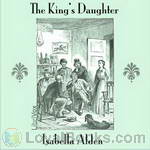 The King's Daughter
The King's Daughter
Dell Bronson has been reared in Boston by her refined uncle and aunt until, at age 18, she is called home by her father, a coarse tavern owner in Lewiston. As a daughter of the heavenly King, she strives to honor her heavenly Father by wooing her earthly father to Christ and away from rum. Set in the era of the temperance movement of the 1800’s. Authored by Isabella M. Alden under the pen name “Pansy.” Third in the Ester Ried series. | |
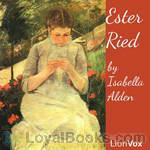 Ester Ried
Ester Ried
Authored by Isabella M. Alden under the pen name “Pansy.” Ester Ried’s life is a dull monotony of toiling at her family’s boardinghouse. She’s overworked, jealous and cranky, a poor example of a Christian to her family and associates. She awakens to a new attitude and commitment due to an extended visit with her cousin. | |
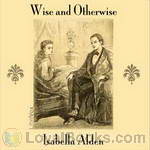 Wise and Otherwise
Wise and Otherwise
Immature Mr. Tresevant (from “The King’s Daughter”) comes to Newton with his spoiled wife to be the new pastor of the church attended by Dr. and Mrs. Douglass, Mr. and Mrs. Sayles, and Mr. and Mrs. Tyndall (from “Ester Ried” and “Julia Ried”), boarding with Jerome and Abbie Sayles. Authored by Isabella M. Alden under the pen name “Pansy.” Fourth in the Ester Ried series. | |
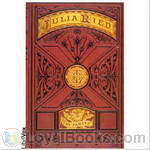 Julia Ried
Julia Ried
Authored by Isabella M. Alden under the pen name “Pansy.” Sequel to “Ester Ried.” Julia Ried must take a job as a bookkeeper in a factory to earn a living. The mistress of her boardinghouse influences her in a negative way, drawing her into a life and attitude displeasing to God. Will her family and friends be able to convince her stand up for what’s right? | |
 Four Girls at Chautauqua
Four Girls at Chautauqua
Authored by Isabella M. Alden under the pen name “Pansy.” First in the Chautauqua Girls series. Four friends – spoiled, quirky Ruth; fun-loving and mischievous Eurie; poor, independent and brainy Marion; and meek, approval-seeking Flossy – attend Chautauqua on a lark, and their lives are changed forever. (Chautauqua is an adult education movement in the United States, highly popular in the late 19th and early 20th centuries. The Chautauqua brought entertainment and culture for the whole community, with speakers, teachers, musicians, entertainers, preachers and specialists of the day.) | |
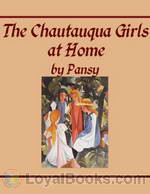 The Chautauqua Girls at Home
The Chautauqua Girls at Home
Sequel to Four Girls at Chautauqua. Ruth, Flossy, Eurie, and Ruth return home as new Christians, eager to begin working. Their new faith clashes with their old lives, which they must overcome, as well as the prejudices of friends and acquaintances. | |
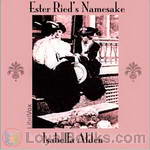 Ester Ried's Namesake
Ester Ried's Namesake
Ester Ried Randall tries to live up to her parents’ expectations and the name she’s been given, but her religion is a chore. Will she learn the lesson of faith that Ester did? Fifth and final book in the Ester Ried series. Authored by Isabella M. Alden under the pen name “Pansy.” | |
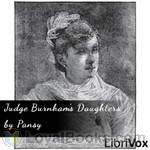 Judge Burnham's Daughters
Judge Burnham's Daughters
Fifth in the Chautauqua Girls series. Ruth Erskine Burnham has helped raise her husband’s two daughters, but all have rejected her faith and values. The constant pressure to compromise has weakened her walk and made her life miserable. Her one comfort is her somewhat sickly 5 year old son. Will she return to the strong faith of her young womanhood, and will her family finally follow? | |
 Ruth Erskine's Crosses
Ruth Erskine's Crosses
Third book in the Chautauqua Girls series. Written by Isabella Alden under the pseudonym “Pansy.” Ruth’s father brings home a wife and daughter, after 18 years, that Ruth had never known about. Suddenly she is no longer the queen of her home. And what’s worse, the new mother and sister are rude and antagonistic. How will Ruth bear this cross? | |
By: Isabella Lilias Trotter (1853-1928) | |
|---|---|
 Parables of the Cross
Parables of the Cross
Death is the Gate of Life. There was deep insight in those old words. For man's natural thought of death is that of a dreary ending in decay and dissolution. And from his standpoint he is right: death as the punishment of sin is an ending.But far other is God's thought in the redemption of the world. He takes the very thing that came in with the curse, and makes it the path of glory. Death becomes a beginning instead of an ending, for it becomes the means of liberating a fresh life.And so the hope that lies in these parable lessons of death and life is meant for those only who are turning to Him for redemption... | |
 Parables of the Christ-life
Parables of the Christ-life
| |